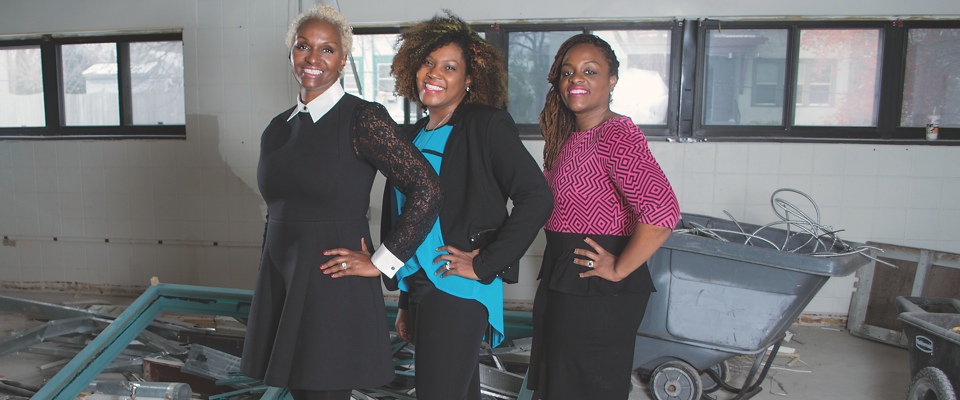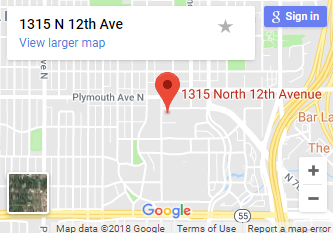-
BY DAN EMERSON
WEDNESDAY, DECEMBER 17, 2014Later this year, entrepreneur Gloria Freeman will fulfill a dream when she opens Olu’s Center, a multi-generational daycare center in north Minneapolis. Getting the loans needed to finance it required two years worth of networking, negotiations, and paperwork — and plenty of moving parts.Since 1999, Freeman, a former insurance underwriter, has headed Olu’s Home, a licensed care organization that provides residential and in-home services to the elderly and persons with developmental disabilities or mental illness. The company operates nine group homes in the Minneapolis area.About five or six years ago, Freeman started thinking about expanding her business by opening a multi-generational daycare center to serve infants to school-age children, and also seniors.To do that, Freeman needed to find and acquire — and renovate and equip — a suitable building. In 2012, she began seeking a loan that would help her accomplish that.The first place she inquired was Associated Bank in Minneapolis, where she has been a customer for a number of years. However, because the planned daycare center would be considered a new business — with the financial risk that typically accompanies such ventures — the project did not meet Associated’s lending guidelines. But the bank “did see the value in the concept,” says Ben Veach, relationship manager and vice president of commercial lending. “We were happy to refer Gloria to another bank whose guidelines are structured differently.”Veach referred Freeman to 21st Century Bank, where he had worked before joining Associated. Because 21st Century is an active Small Business Administration lender (it’s won awards for its participation in SBA loan programs), Veach figured the bank could probably help Freeman finance her new business.He was right. But the financing wouldn’t have happened without some additional assistance from nonprofits. The lead facilitator on that end was the Metropolitan Economic Development Association (MEDA). Founded in 1971, the organization provides assistance to companies owned and managed by entrepreneurs of color, including one-on-one business consulting, leadership development, access to financing, and more.In the wake of the sub-prime mortgage crisis, tighter lending standards have made it more difficult for some small and midsize businesses to obtain financing, says Patrick Pariseau, a business consultant at MEDA. Federal regulators have imposed more stringent underwriting regulations, specifically certain debt-to-income ratios and equity requirements for loan recipients.In Freeman’s case, conventional bank financing would have required her to provide cash equal to 25 percent of the building’s purchase price, plus 3 percent in closing costs. Banking regulations permit loans of up to 75 percent of the appraised price or purchase value of a property, Pariseau notes. “It can be difficult for a small business to come up with that cash.”Using the SBA program made it possible to reduce Freeman’s equity requirement to 15 percent, plus the additional 3 percent, Pariseau says.Along with the risk of starting a new business, another factor stood in the way of Freeman obtaining a bank loan to buy a building: the mortgages she was carrying on seven of her existing group homes. 21st Century Bank used the SBA’s 7(a) loan program to refinance the mortgages, packaging them into one mortgage with a more favorable interest rate, according to Gregg Klohn, the bank’s senior vice president of commercial lending. Doing so improved the existing business’s cash flow and also helped make it possible for Freeman to finance the new business.Klohn’s bank did not want to take on both the refinancing and building acquisition aspects of the project, so he conferred with Pariseau, with whom he had worked on previous projects. Pariseau agreed to help Freeman finance the purchase. “MEDA has been doing a good job working with some of the local banks to help newer businesses,” Klohn says.Freeman wanted to open her new facility in north Minneapolis, where she had opened her first group home 15 years ago. She knew opening a new business there would provide a needed infusion of jobs in an area that could use a boost.She found the building she was looking for at 1315 12th Ave. N, an 18,000-square-foot concrete structure that most recently housed The City Inc., an alternative school that closed in 2011.To help put together a loan to finance acquisition and renovation, MEDA’s Pariseau contacted the Minneapolis-based nonprofit Community Reinvestment Fund (CRF). One of the few non-banks in the United States certified to make SBA loans, CRF has been working in the Twin Cities area more than a quarter century and has made more than 649 loans totaling $89.7 million. It has injected more than $1.5 billion into economically disadvantaged communities around the nation.CRF, 21st Century Bank, and MEDA were able to assemble a $1.3 million loan package. Freeman’s project also became the first in the Twin Cities to benefit from “Ours to Own,” an initiative of the Maryland-based nonprofit Calvert Foundation and CRF. Offering loans to small businesses that have difficulty securing financing from commercial lenders, it enables individual investors to invest as little as $20 and earn interest, while supporting CRF’s small-business lending program in distressed neighborhoods.When the deal was announced, Frank Altman, CRF’s president and CEO, called it “a double win” for the local economy and community, since Freeman’s company will create 25 good jobs and provide care to more toddlers and seniors.Pariseau also referred Freeman to the City of Minneapolis’s Business Development Fund, which approved a $75,000 loan to help cover the costs of renovating and equipping the building. Kristin Guild, the city’s manager of business development, met Freeman three years ago when Freeman participated in a training program on intensive growth strategies for emerging entrepreneurs, sponsored by the SBA.To make the loan, the city partnered with CRF, which provided loan servicing and underwriting. The loan is partially forgivable, Guild says. Recipients can obtain credits for up to 50 percent of a loan amount, if they hire a certain number of Minneapolis residents for “living wage” jobs and retain them as employees.Freeman says she appreciates the roles that the bank, the city, MEDA, and CRF played in her expansion. “MEDA was my buddy through the whole process,” she says. “They have connections. They know people who can help. As business owners, we are diehards, but sometimes it gets tough for us. When my spirits were down, they were there to lift me up.”“This was her dream,” Pariseau says. “Gloria worked hard to make sure it would happen.”
Resources Olu's Beginnings Olu's LLC
Olu's Quick Links
Corporate Information
Olu’s Home, Inc./Olu’s LLC.
1315 12th Avenue North
Minneapolis, MN 55411
Office: 612-824-1142
Fax: 612-824-1456
info@olushome.com
© 2019 Olu's Home, Inc., All rights reserved.
Website by RDL Web Designs



